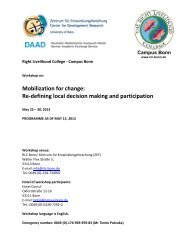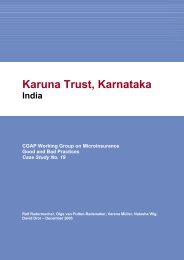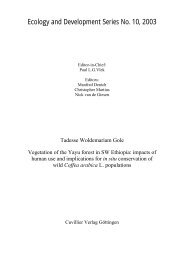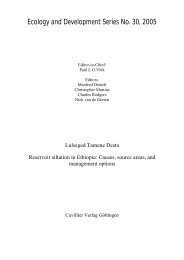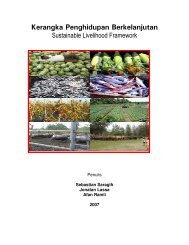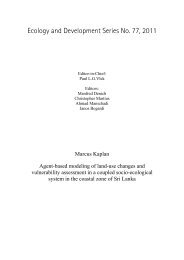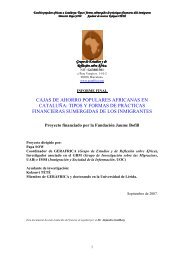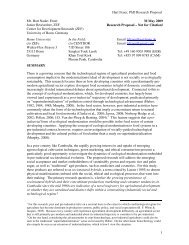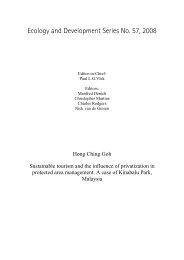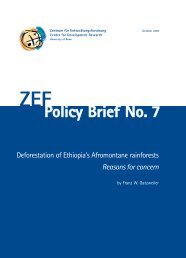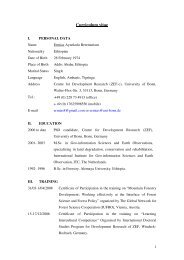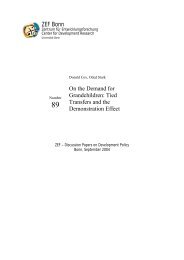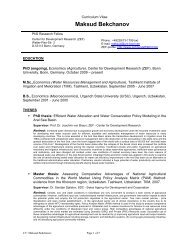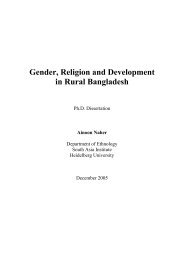ZEF Bonn
ZEF Bonn
ZEF Bonn
You also want an ePaper? Increase the reach of your titles
YUMPU automatically turns print PDFs into web optimized ePapers that Google loves.
3.2.1 Impact of land use and management on soil erosion<br />
One of <strong>ZEF</strong>'s interdisciplinary, core research projects dealing<br />
with these issues is located in Uzbekistan. “Economic and<br />
Ecological Restructuring of Land and Water Use in the<br />
Khorezm Region (Uzbekistan): A Pilot Project in Development<br />
Research" is described in detail in a previous section.<br />
The second interdisciplinary project deals with the “Policies for<br />
Improved Land Management in Uganda". The long-term goal<br />
of this project is to contribute to improved land management<br />
in Uganda in order to increase agricultural productivity, reduce<br />
poverty, and ensure sustainable use of natural resources. The<br />
immediate purpose is to help policy-makers identify and assess<br />
policy and institutional and technological strategies to improve<br />
land management in Uganda.<br />
The contribution of the department 'Ecology and Resource Management' includes:<br />
● the stratification of land management domains throughout Uganda using geographical<br />
information system (GIS),<br />
● an assessment of nutrient balance and various technological options for sustainable<br />
land use,<br />
● the development of site-specific land management strategy utilising a deterministic<br />
erosion model,<br />
● the application of radio-nuclide techniques (Cs-137 and Pb-210) to assess longterm<br />
soil degradation in Uganda and<br />
● the development of the crop growth model (DSSAT) and Artificial Neural<br />
Network (ANN) crop simulator to assess the influence of various technological<br />
options on potential crop yield.<br />
The integration of all these methodologies for a more sustainable landscape-based<br />
resource management is currently under investigation.<br />
The stratification of land management domains was performed at the beginning of<br />
the project. This stratification procedure combines the potential for market access,<br />
population density, and the agricultural potential to delineate spatial domains of<br />
land management over Uganda as a whole. Its output provided the main selection<br />
criteria for subsequent market, community, household and plot surveys. During the<br />
field survey in 2000 and 2001, the mapping of natural resources and soil surveys<br />
were also conducted to identify a large-scale natural resource distribution pattern<br />
throughout Uganda.<br />
Detailed surveys were carried out in seven districts of Eastern Uganda to estimate<br />
nutrient balances at farm level. Comprehensive natural processes and farming activities<br />
were included in the calculation of the nutrient balance. It turned out that the<br />
balances were negative for all nutrients across the sites covered. The major avenues<br />
of nutrient losses are through marketing of crops and soil erosion. On-farm research<br />
was conducted at four sites each among 14 to 17 randomly selected farmers in<br />
Eastern Uganda to evaluate the potential of various agronomic techniques to improve<br />
maize and rice production in the region. In addition to examining various technological<br />
options for resource-poor farmers in Eastern Uganda, the most suitable strate-<br />
Research<br />
The Minister of Agriculture<br />
and Water Management of<br />
the Republic of Uzbekistan<br />
at his inaugural speech of<br />
the Uzbekistan Project in<br />
Taschkent, May 2002.<br />
Detailed surveys were carried<br />
out in seven districts of<br />
Eastern Uganda to estimate<br />
nutrient balances at the farm<br />
level. It turned out that the<br />
balances were negative for all<br />
nutrients across the sites covered.<br />
57



